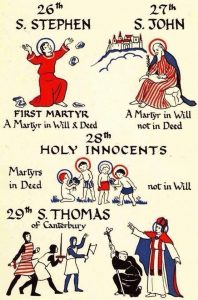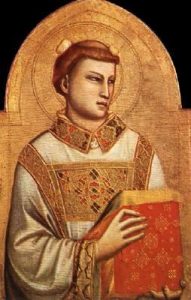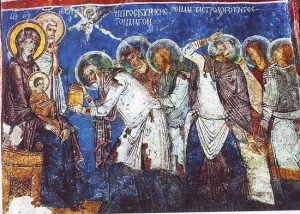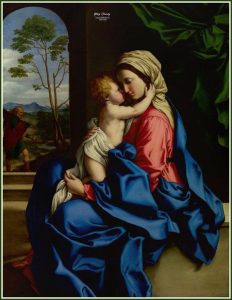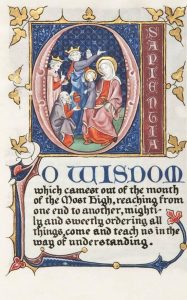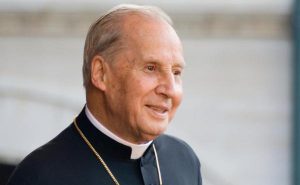Each Antiphon begins with “O” and addresses Jesus with a unique title which comes from the prophecies of Isaiah and Micah, and whose initials, when read backwards, form an acrostic for the Latin “Ero Cras” which means “Tomorrow I come.” Those titles for Christ are:
Starting tonight, we begin with Sapientia; tomorrow and the days ahead we move on to: Adonai, Radix Jesse, Clavis David, Oriens, Rex Gentium, Emmanuel
The O Antiphons in both English and Latin:
December 17
Wisdom that comest out of the mouth of the Most High, that reachest from one end to another, and orderest all things mightily and sweetly, come to teach us the way of prudence!
Latin
O Sapientia, quæ ex ore Altissimi prodiisti, attingens a fine usque ad finem, fortiter suaviterque disponens omnia: veni ad docendum nos viam prudentiæ.
December 18
Adonai, and Ruler of the house of Israel, Who didst appear unto Moses in the burning bush, and gavest him the law in Sinai, come to redeem us with an outstretched arm!
Latin
O Adonai, et Dux domus Israel, qui Moysi in igne flammæ rubi apparuisti, et ei in Sina legem dedisti: veni ad redimendum nos in brachio extento.
December 19
Root of Jesse, which standest for an ensign of the people, at Whom the kings shall shut their mouths, Whom the Gentiles shall seek, come to deliver us, do not tarry.
Latin
O Radix Jesse, qui stas in signum populorum, super quem continebunt reges os suum, quem Gentes deprecabuntur: veni ad liberandum nos, jam noli tardare.
December 20
Key of David, and Sceptre of the house of Israel, that openeth and no man shutteth, and shutteth and no man openeth, come to liberate the prisoner from the prison, and them that sit in darkness, and in the shadow of death.
Latin
O Clavis David, et sceptrum domus Israel; qui aperis, et nemo claudit; claudis, et nemo aperit: veni, et educ vinctum de domo carceris, sedentem in tenebris, et umbra mortis.
December 21
Dayspring, Brightness of the everlasting light, Sun of justice, come to give light to them that sit in darkness and in the shadow of death!
Latin
O Oriens, splendor lucis æternæ, et sol justitiæ: veni, et illumina sedentes in tenebris, et umbra mortis.
December 22
King of the Gentiles, yea, and desire thereof! O Corner-stone, that makest of two one, come to save man, whom Thou hast made out of the dust of the earth!
Latin
O Rex Gentium, et desideratus earum, lapisque angularis, qui facis utraque unum: veni, et salva hominem, quem de limo formasti.
December 23
Emmanuel, our King and our Law-giver, Longing of the Gentiles, yea, and salvation thereof, come to save us, O Lord our God!
Latin
O Emmanuel, Rex et legifer noster, exspectatio gentium, et Salvator earum: veni ad salvandum nos Domine Deus noster.
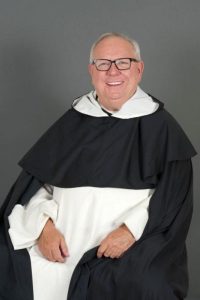 I just read on Facebook that an old friend died peacefully preparing for bed on Christmas night at St. Catherine of Siena Priory (NYC). Jolting news in this time of joy.
I just read on Facebook that an old friend died peacefully preparing for bed on Christmas night at St. Catherine of Siena Priory (NYC). Jolting news in this time of joy.